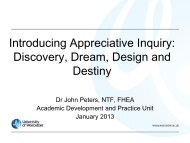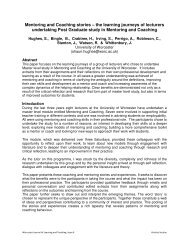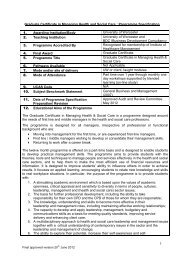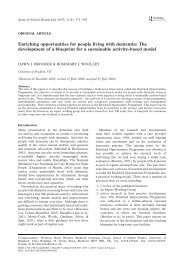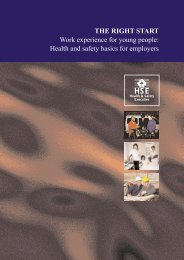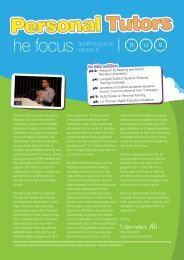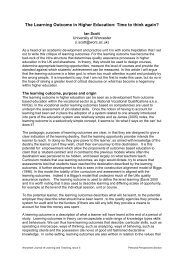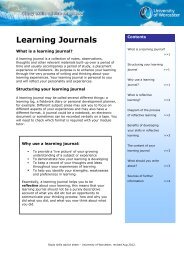BSc (Hons) - University of Worcester
BSc (Hons) - University of Worcester
BSc (Hons) - University of Worcester
Create successful ePaper yourself
Turn your PDF publications into a flip-book with our unique Google optimized e-Paper software.
<strong>BSc</strong> (<strong>Hons</strong>) Plant Science<br />
PROGRAMME SPECIFICATION<br />
1 Awarding institution/body <strong>University</strong> <strong>of</strong> <strong>Worcester</strong><br />
2 Teaching institution <strong>University</strong> <strong>of</strong> <strong>Worcester</strong><br />
3 Programme accredited by N/A<br />
4 Final award B.Sc. <strong>Hons</strong><br />
5 Programme title Plant Science<br />
6 Pathways available Single, only<br />
7 Mode and/or site <strong>of</strong> delivery Face to Face delivery <strong>of</strong> theoretical and practical work with<br />
some blended learning via Blackboard. All modules delivered on the sites <strong>of</strong> the <strong>University</strong> <strong>of</strong><br />
<strong>Worcester</strong>.<br />
8 Mode <strong>of</strong> attendance FT & PT normally during hours <strong>of</strong> 9:15 to 18:15 Monday<br />
to Friday.<br />
9 UCAS Code C210<br />
10 Subject Benchmark statement and/or pr<strong>of</strong>essional body statement<br />
QAA Biosciences Benchmark Statement (2007)<br />
11 Date <strong>of</strong> Programme Specification preparation/revision September<br />
2011/July 2012<br />
12 Educational aims <strong>of</strong> the programme<br />
Plant Science at <strong>Worcester</strong> is a specialist course drawing modules from the biological<br />
science programme and from the geographical and environmental science programmes. It<br />
is very practical and <strong>of</strong>fers students the opportunity to undertake an independent project in<br />
their third year, which is not <strong>of</strong>fered by all Plant Science courses in the UK. The emphasis<br />
on the development <strong>of</strong> ‘hands on’ practical skills provides students with useful skills for their<br />
future careers. The unique <strong>Worcester</strong> science personal development planning (PDP)<br />
scheme is designed to support student personal and career development.<br />
In particular the course aims to:-<br />
a) provide a broad practical laboratory and/or field based Plant Science curriculum.<br />
b) provide a supportive learning environment which acknowledges and responds to the<br />
diversity <strong>of</strong> student backgrounds and experiences, and which allow students the opportunity<br />
to realise their academic potential;<br />
c) provide students with the opportunity to study Plant Sciences at a depth and level<br />
appropriate to honours degree standard;<br />
d) develop to the appropriate pathway level the knowledge, skills and aptitudes <strong>of</strong> Biological<br />
Sciences, within an interdisciplinary, undergraduate degree scheme;<br />
e) enable students to work independently, analytically and critically;<br />
f) encourage students to develop a range <strong>of</strong> subject-specific and transferable skills<br />
appropriate to graduate employment and/or postgraduate study in Biology.
13 Intended learning outcomes and learning, teaching and<br />
assessment methods<br />
At the end <strong>of</strong> their course, students should be able to:<br />
a) have knowledge <strong>of</strong> material and an understanding <strong>of</strong> a range <strong>of</strong> botanical concepts<br />
and principles at a variety <strong>of</strong> levels (from sub-cellular to whole organisms);<br />
b) access information from a variety <strong>of</strong> sources and show pr<strong>of</strong>iciency in assessing,<br />
evaluating, analysing, and synthesising the scientific information and data;<br />
c) communicate botanical information and principles in an appropriate manner, employing<br />
skills <strong>of</strong> written, oral and visual communication, numerical analysis and information<br />
technology;<br />
d) design ,execute and critically evaluate the outcomes <strong>of</strong> investigations carried out<br />
individually and in groups;<br />
e) record data accurately, analyse and interpret those data and test hypotheses;<br />
f) have practical skills in laboratory and/or field work, and be able to work safely and<br />
appropriately in these environments;<br />
g) have an understanding <strong>of</strong> ethical issues related to plant science;<br />
h) work co-operatively with others, while demonstrating an increasing understanding <strong>of</strong><br />
how to be an independent learner;<br />
i) plan, carry out and present a piece <strong>of</strong> hypothesis-driven work for an independent study<br />
in plant science.<br />
Tables mapping the learning outcomes <strong>of</strong> the course to the modules are detailed in the<br />
Biological Sciences Programme student handbook.<br />
13.1 Learning and teaching assessment methods<br />
The Plant Science course aims to provide supportive, student-centred learning environments<br />
that acknowledge and respond to the diversity <strong>of</strong> student backgrounds and experiences.<br />
The structure <strong>of</strong> the course enables students to move towards increasing independence in<br />
their studies from level 4 to level 6 in line with the Framework for Higher Education<br />
Qualifications (FHEQ) and <strong>University</strong> policies for assessment and curriculum design. Level<br />
4 modules <strong>of</strong>fer students structured tutor support for their learning, whilst at level 5 this<br />
support becomes less structured, although the extent to which this occurs varies with the<br />
difficulty <strong>of</strong> the task. All level 6, modules <strong>of</strong>fer students opportunities for more independent<br />
learning, although specific tutor help will always be available. Learning outcomes, and<br />
hence assessments will always be more demanding at level 6.<br />
Students will participate in a wide range <strong>of</strong> learning experiences. Teaching, assessment and<br />
private study are interlinked in that they are all aspects <strong>of</strong> each student’s personal and<br />
academic development. A list <strong>of</strong> the range <strong>of</strong> learning experiences that may be encountered<br />
on the course are given below:-<br />
Lectures, practical sessions, practical demonstrations, seminars, student-led seminars, selfinstructional<br />
workbooks, workshops, tutorials, field work, field classes, field trips, field visits,
directed reading, independent study, group projects, web conferencing, self-directed study,<br />
reflective accounts <strong>of</strong> own work, group work, self-study packages, blended learning,<br />
laboratory investigations, class discussions, computer simulations, case studies,<br />
independent research, role-play, visiting speakers, reflective learning, interviews.<br />
The course employs a variety <strong>of</strong> assessment methods, for more details please see section<br />
14 <strong>of</strong> this programme specification.<br />
13.2 Student skills<br />
Students will be able to obtain a wide range <strong>of</strong> skills on this course, e.g. a range <strong>of</strong> subjectspecific<br />
and transferable skills appropriate to graduate employment and/or postgraduate<br />
study in Plant Science, for details please see PDP tables in the Biological Sciences<br />
Programme student handbook.<br />
14 Assessment Strategy<br />
The approach to assessment is to use a wide range <strong>of</strong> assessment techniques (see<br />
assessment matrix in Biological Sciences Programme student handbook), each module<br />
normally has at least two different types <strong>of</strong> assessment. Every module will carry at least one<br />
form <strong>of</strong> formative and will deliver extensive feedback on assessments to allow students to<br />
improve their performance.<br />
The assessment structure has been developed to support student learning by providing<br />
assessment procedures that reflect the nature and learning experience <strong>of</strong> each module, and<br />
by ensuring that the students are able to demonstrate ability in a wide range <strong>of</strong> qualities and<br />
skills appropriate to the course.<br />
Plant Science is a very practical course so there is considerable emphasis on coursework,<br />
although examinations and other forms <strong>of</strong> assessment are also utilised. We define formal<br />
formative assessment as formative work that is formally scheduled in modules. Formal<br />
formative assessment is <strong>of</strong>fered on modules at all levels <strong>of</strong> the course but is especially<br />
prevalent at level 4 in the new 30 credit modules (see assessment matrix in Biological<br />
Sciences Programme student handbook). Here, rapid feedback via personal response<br />
systems will be used. Informal formative assessment is also <strong>of</strong>fered on all modules on the<br />
course. A range <strong>of</strong> assessment methods is utilised to assess the learning outcomes <strong>of</strong> the<br />
course. Coursework assessment includes practical files, practical reports, critique, essays,<br />
seminar reports, abstracts and presentations. Examinations comprise, long answer, short<br />
answer, multiple choice, practical examinations, seen examinations and oral examinations or<br />
combinations <strong>of</strong> two or more <strong>of</strong> the above methods. This wide range <strong>of</strong> assessment<br />
methods has been devised to test a wide range <strong>of</strong> student skills.<br />
The Plant Science course employs the UW generic undergraduate assessment criteria (see<br />
<strong>University</strong> Handbook), specific interpretation and elaboration <strong>of</strong> which will be outlined in<br />
assessment briefs within each individual module handbook given to the students. A table<br />
showing how each <strong>of</strong> the modules is assessed can be found in the Biological Sciences<br />
Programme student handbook.<br />
15 Programme structures and requirements<br />
Award Map.<br />
Modules are delivered at levels 4, 5 and 6 <strong>of</strong> the Framework for Higher education<br />
Qualifications (FHEQ). Note that all modules are 15 credits with the exception <strong>of</strong> the
Credits<br />
Single<br />
Credits<br />
Single<br />
independent study and some modules which are 30 credits operating over both semesters.<br />
All modules are mandatory unless alternatives or options are specified.<br />
AWARD MAP FOR A SINGLE, HONOURS AWARDS<br />
Title: Plant Science<br />
Year: 2011 Last Updated: September 2011<br />
Module<br />
Code<br />
LEVEL 4<br />
Module Title<br />
Status (Mandatory<br />
(M) or Optional(O)<br />
Prerequisites<br />
(Code <strong>of</strong><br />
Module<br />
required)<br />
BIOS 1200 Biological Diversity 30 M None<br />
BIOS 1201 Cell Biology 30 M None<br />
BIOS 1205 Introduction to Molecular Biology 15 O 1 None<br />
ENVS 1010 Introduction to Environmental Science 30 O None<br />
ENVS 1100 Introduction to Ecology 15 M None<br />
ENVS 1102 Biological Basis <strong>of</strong> Surveying 15 O None<br />
GEOG 1012 Landforms & Landscapes 15 M None<br />
1 – Highly recommended to students without A level Chemistry<br />
Single Honours Requirements at Level 4<br />
Single Honours students must take the Mandatory modules [BIOS 1200, BIOS 1201, ENVS 1100<br />
GEOG 1012)<br />
In addition:<br />
All Students are permitted to choose two (2) Free Choice modules at Level 4 from other Open<br />
modules within the Undergraduate Regulatory Framework or two (2) further Optional modules from<br />
Biology as listed above (including the shared modules from other subject areas) subject to availability.<br />
Students, are highly recommended to take ENVS 1001 if they decide to take their free modules in<br />
Plant Science..<br />
Module<br />
Code<br />
LEVEL 5<br />
Module Title<br />
Status (Mandatory<br />
(M) or Optional(O)<br />
Prerequisites<br />
(Code <strong>of</strong><br />
Module<br />
required)<br />
BIOS 2003 Work Experience 15 O BIOS 1201<br />
BIOS 2004 Research Methods 15 M None<br />
BIOS 2023 Microbiology 15 M BIOS 1201<br />
BIOS 2024 Infectious Agents and Allergens 15 O BIOS 1200 or 1201<br />
0r 1204<br />
ENVS 2104 Ecology <strong>of</strong> Fresh Waters 15 O ENVS 1100<br />
ENVS 2103 Field Techniques in Ecology 15 M ENVS 1100<br />
BIOS 2040 Botany 15 M BIOS 1201 or 1200<br />
BIOS 2100 Molecular Genetics 15 M BIOS 1201<br />
ENVS 2100 Population & Community Ecology 15 O ENVS 1100<br />
ENVS 2101<br />
Conservation Ecology <strong>of</strong> Habitats and<br />
Species<br />
15 O ENVS 1100, 1102<br />
& 2100
Credits<br />
Single<br />
ENVS 2006 Soils and the Environment 15 M ENVS 1100 or<br />
1001 or 1010 or<br />
GEOG 1011<br />
Single Honours Requirements at Level 5<br />
Students must take the 6 (six) Mandatory modules (BIOS 2004, BIOS 2023, ENVS 2103, BIOS 2040,<br />
BIOS 2100 and ENVS 2006). Students are advised to select at least one <strong>of</strong> their remaining modules<br />
from the options given above.<br />
In addition:<br />
All Students are permitted to choose two (2) Free Choice modules at Level 4 from other Open<br />
modules within the Undergraduate Regulatory Framework or two (2) further Optional modules from<br />
Biology as listed above (including the shared modules from other subject areas) subject to availability.<br />
Students, are recommended to take one or more <strong>of</strong> the modules from the following BIOS 2003, BIOS<br />
2024, BIOS 2030 and ENVS 2101.<br />
Module<br />
Code<br />
LEVEL 6<br />
Module Title<br />
Status (Mandatory<br />
(M) or Optional(O)<br />
Prerequisites<br />
(Code <strong>of</strong><br />
Module<br />
required)<br />
BIOS 3001/2 Independent Study 30 M BIOS 2004 or<br />
BIOS3104<br />
BIOS 3003 Work Experience 15 O BIOS 1201<br />
BIOS 3041 Plant Development & Physiology 15 M BIOS 2040<br />
BIOS 3053 Biological Indicators for Crime 15 O None<br />
Reporting<br />
BIOS 3100 Integrated Studies in Biology 15 M None<br />
BIOS 3114 Research Methods and Project for 30 O 1 None<br />
Direct entry students<br />
BIOS 3105 Conservation Genetics 15 O None<br />
BIOS 3107 Physiological Ecology 15 O BIOS 1200 or 1202<br />
ENVS 3100 Residential Ecology Field trip 15 M ENVS 1100 or<br />
1010 or 1001<br />
ENVS 3102 Environmental Impact Assessment 15 O ENVS 1100, and<br />
(1102 or 1010),<br />
and( 2103 or 2001)<br />
ENVS 3103 Restoration Ecology 15 O ENVS 1100 & 2100<br />
& either 1102 or<br />
2103<br />
BIOS 3109 Genomics and Bioinformatics 15 O<br />
1 - Direct entry students may be required to take this module depending on their background.<br />
Single Honours Requirements at Level 6<br />
Single Honours students must take the double mandatory Independent Study module (BIOS 3001/02)<br />
over one or two semesters, BIOS 3100, BIOS 3041 and ENVS 3100. Students must also take an<br />
additional three modules identified as optional from the above table.<br />
Animal welfare<br />
All students should be aware that animal welfare and ethical regulations apply to this course<br />
and they must not be in breach <strong>of</strong> current legislation.<br />
16 QAA Academic Infrastructure<br />
The course has been developed with reference to the QAA Biosciences Benchmark<br />
Statement (2007) which have been used to inform course outcomes and skills. We
also follow the QAA and UW guidelines on work experience. The course operates at<br />
levels four, five and six <strong>of</strong> the Framework for Higher Education Qualifications.<br />
17 Support for students<br />
Plant Science students experience a wide variety <strong>of</strong> learning and teaching methods<br />
detailed in 13.1 above<br />
An induction programme extended throughout year in one <strong>of</strong> the 30 credit modules in<br />
year 1.<br />
Year 2 and 3 induction sessions at the start <strong>of</strong> each academic year.<br />
All students have a personal tutor who is available to guide them through completion<br />
<strong>of</strong> a PDP related to the current Biosciences Benchmarks. All tutors also have an<br />
open door policy.<br />
An award leader to <strong>of</strong>fer more specific help on module choices within awards.<br />
Library and ILS induction.<br />
Opportunities to take IT training via Information and Learning Services at the<br />
<strong>University</strong>.<br />
Study Skills provided within the subject and by UW student services.<br />
Library, IT, Media and Print support is provided by Information and Learning Services<br />
(ILS) staff through desk services and the support <strong>of</strong> pr<strong>of</strong>essionally-qualified librarians<br />
including a dedicated Academic Liaison Librarian for ISE. The Academic Liaison<br />
Team <strong>of</strong>fers a portfolio <strong>of</strong> pr<strong>of</strong>essional information services, including information<br />
literacy programmes for cohorts and one-to-one support, both in-person and online<br />
The Careers Service provides information, advice and training opportunities for<br />
career planning in addition to such opportunities <strong>of</strong>fered within the course.<br />
Career planning skills also developed in BIOS 3100.<br />
Science PDP scheme to develop student skills.<br />
Equal opportunities via the Disability & Dyslexia Service which provides advice and<br />
support for students who have mental health difficulties, dyslexia, sensory or physical<br />
impairments and other difficulties. There is a dedicated Assistant Disability<br />
Coordinator for students with sensory impairments. Advice is also available on<br />
access to technology such as voice recognition and text-to-speech s<strong>of</strong>tware. Much <strong>of</strong><br />
the support provided is funded through the Disabled Students’ Allowance (DSA).<br />
A Virtual Learning Environment (Blackboard Learning System) to provide modulespecific<br />
material, documents, activities.<br />
Students can obtain details <strong>of</strong> module availability, registration and results via the<br />
student online learning environment (SOLE page).
A range <strong>of</strong> student support services, including finance and accommodation advice.<br />
Detailed module outlines (module handbooks), which include planned teaching<br />
activity, attendance requirements, assessment brief, assessment criteria and reading<br />
lists.<br />
Student Handbook (published on an annual basis), which adheres to the latest<br />
<strong>University</strong> template for such documents.<br />
Opportunities to study abroad (optional)<br />
Student and academic support, representation and social networking via the<br />
Students’ Union.<br />
Section 1 <strong>of</strong> the Biological Sciences student handbook provides detailed information on the<br />
course and information on modules and options available.<br />
18 Admissions policy, criteria and procedures<br />
Admissions Policy<br />
The <strong>University</strong> aims to be accessible; it is committed to widening participation and<br />
encouraging diversity in the student population. The Institute <strong>of</strong> Science and the<br />
Environment works closely with central student support services, including the Admissions<br />
Office, the Disability and Dyslexia Service and the International Office, to support students<br />
from a variety <strong>of</strong> backgrounds. We actively encourage and welcome people from the widest<br />
range <strong>of</strong> economic and cultural backgrounds, and value the contribution <strong>of</strong> mature learners.<br />
Entry requirements:<br />
The minimum entry requirements are 4 GCSEs (Grade C or above) including English and<br />
Maths plus a minimum <strong>of</strong> 2 and maximum <strong>of</strong> 3.5 A Levels or equivalent Level 3<br />
qualifications, with a UCAS Tariff score as stated in the <strong>University</strong> prospectus. Applicants<br />
must have studied Biology to at least AS level or equivalent, and normally applicants must<br />
have an A level pass in Biology, although applicants who have not studied science for<br />
sometime or do not have a science background will be considered. The study <strong>of</strong> other<br />
sciences such as Chemistry would be an advantage.<br />
Students may also enter with EDEXCEL qualifications e.g. EDEXCEL (BTEC) National<br />
Certificate or Diploma to in a suitable subject<br />
The <strong>University</strong> will also consider applications from candidates holding qualifications outside<br />
the UCAS Tariff, including those awarded by pr<strong>of</strong>essional bodies and overseas qualifications<br />
(including the European Baccalaureate).<br />
Details <strong>of</strong> acceptable level 3 qualifications, policy in relation to mature students or applicants<br />
with few or no formal qualifications can be found in the prospectus or on the <strong>University</strong><br />
webpages. Information on eligibility for accreditation <strong>of</strong> prior learning for the purposes <strong>of</strong><br />
entry or advanced standing is also available from the <strong>University</strong> webpages or from the<br />
Registry Admissions Office (01905 855111).<br />
Admissions Procedures:<br />
Full-time applicants apply through UCAS (C 210)<br />
Part-time applicants apply directly to <strong>University</strong> <strong>of</strong> <strong>Worcester</strong> (UW)<br />
Non-standard entry students, such as mature students, may be asked to attend an interview.
Mature Students:<br />
We welcome applicants who hold alternative qualifications/experience and mature students<br />
who can demonstrate the ability to benefit from the course and show their potential to<br />
complete the course successfully. Although recent preparatory study at an appropriate level<br />
(e.g. an Access to Higher Education Diploma) is recommended, students may be considered<br />
on the basis <strong>of</strong> prior evidenced pr<strong>of</strong>essional/work experience and/or other assessment<br />
procedures, and the assessment <strong>of</strong> personal suitability. <strong>University</strong> Admissions <strong>of</strong>fice staff<br />
can <strong>of</strong>fer information, advice and guidance on this process.<br />
Accreditation <strong>of</strong> Prior Learning:<br />
Students with relevant previous study at HND or degree level or extensive experience may<br />
be considered eligible for Accreditation <strong>of</strong> Prior Learning.<br />
Entry may be possible to Year Two or Three <strong>of</strong> the course, depending upon the<br />
qualifications or experience gained. Credit can also be given for individual modules.<br />
Please contact the Registry Admissions Office for further information or guidance on 01905<br />
855111.<br />
Admissions/selection criteria:<br />
All applications received by the deadline date are considered and <strong>of</strong>fers are made on the<br />
basis <strong>of</strong> meeting the following criteria:<br />
Does the candidate have the required number <strong>of</strong> GCSE’s in the correct subjects<br />
Does the candidate have an A or AS level equivalent qualification in Biology<br />
Does the candidate have an A or AS level equivalent qualification in another science<br />
Does the candidate meet the required UCAS tariff score for the subjects they have taken<br />
Does the candidate have a satisfactory reference (for most this will be on the UCAS form)<br />
Does the candidate satisfy any other recognised UW entry route (mature student, APEL,<br />
foundation/access course)<br />
19 Methods for evaluating and improving the quality and standards <strong>of</strong><br />
teaching and learning<br />
Mechanisms for review and evaluation <strong>of</strong> teaching, learning and assessment, the curriculum<br />
and outcome standards include:<br />
Student Module evaluation and feedback<br />
An Annual Evaluation Report completed by Programme Leader<br />
Periodic Review and revalidation including external scrutiny<br />
Peer teaching observation<br />
External Examiners’ Reports<br />
Academic staff annual appraisal<br />
Staff Development Away Days and other events<br />
ISE Policy on Approval (Module Outlines and Assignment Briefs) and Moderation <strong>of</strong><br />
Student Work<br />
Committees with responsibility for monitoring and evaluating quality and standards:<br />
ISE Quality Assurance Committee<br />
Biology Programme Committee
Academic Quality Standards and Quality Enhancement Committee<br />
ISE and UW Ethics Committees<br />
Learning, Teaching and Student Experience Committee<br />
Mechanisms for gaining student feedback on the quality <strong>of</strong> teaching and their learning<br />
experience:<br />
Module feedback questionnaires<br />
Biology Programme Committee<br />
Meetings with module tutors and personal tutor<br />
National Students Survey<br />
Induction, exit and other ad hoc surveys<br />
20 Regulation <strong>of</strong> assessment<br />
Requirements to pass modules<br />
Modules are assessed using a variety <strong>of</strong> assessment activities which are detailed<br />
in the module specifications.<br />
The minimum pass mark is D- for each module.<br />
Students are required to submit all items <strong>of</strong> assessment in order to pass a module,<br />
and in some modules, a pass mark in each item <strong>of</strong> assessment may be required.<br />
Some modules have attendance requirements.<br />
Full details <strong>of</strong> the assessment requirements for a module, including the<br />
assessment criteria, are published in the module outline.<br />
Submission <strong>of</strong> assessment items<br />
Students who submit course work late but within 5 days <strong>of</strong> the due date will have<br />
work marked, but the grade will be capped at D- unless an application for<br />
mitigating circumstances is accepted.<br />
Students who submit work later than 5 days but within 14 days <strong>of</strong> the due date will<br />
not have work marked unless they have submitted a valid claim <strong>of</strong> mitigating<br />
circumstances.<br />
Students who fail to submit an item <strong>of</strong> assessment lose their right to reassessment<br />
in that module, and will be required to retake the module.<br />
For full details <strong>of</strong> submission regulations see Undergraduate Regulatory<br />
Framework (URF).<br />
Retrieval <strong>of</strong> failure<br />
Students are entitled to resit failed assessment items for any module that is<br />
awarded a fail grade, unless the failure was due to non-attendance or nonsubmission.<br />
Reassessment items that are passed are graded at D-.<br />
If a student is unsuccessful in the reassessment, they have the right to retake the<br />
module (or, in some circumstances, take an alternative module).<br />
Requirements for Progression<br />
Students at Level 4 may be permitted to progress to Level 5 when they have<br />
passed at least 90 credits at Level 4.<br />
Students at Level 5 may be permitted to progress to Level 6 when they have<br />
passed at least 90 credits at Level 5.
A student who fails 90 credits or more due to non-submission will be required to<br />
withdraw from the <strong>University</strong>.<br />
Students who pass less that 90 credits but have submitted all items <strong>of</strong> assessment<br />
will be required to retake modules<br />
Requirements for Awards<br />
Award<br />
CertHE<br />
DipHE<br />
Degree (non-honours)<br />
Degree with honours<br />
Requirement<br />
Passed 120 credits at Level 4 or higher<br />
Passed a minimum <strong>of</strong> 240 credits with at least 105 credits<br />
at Level 5 or higher<br />
Passed a minimum <strong>of</strong> 300 credits with at least 105 credits<br />
at Level 5 or higher and a minimum <strong>of</strong> 60 credits at Level<br />
6<br />
Passed a minimum <strong>of</strong> 360 credits with at least 105 credits<br />
at Level 5 or higher and a minimum <strong>of</strong> 120 credits at<br />
Level 6<br />
Classification<br />
The honours classification will be determined by whichever <strong>of</strong> the following two<br />
methods results in the higher classification:<br />
Classification determined on the pr<strong>of</strong>ile <strong>of</strong> the best grades from 45 credits<br />
attained at Level 5 and the best grades from 120 credits at Level 6. Level 5<br />
and Level 6 grades count equally in the pr<strong>of</strong>ile.<br />
Classification determined on the pr<strong>of</strong>ile <strong>of</strong> the best grades from 120 credits<br />
attained at Level 6 only.<br />
Institute-level Assessment Boards review and confirm results for modules, and the<br />
Board <strong>of</strong> Examiners considers students’ mark pr<strong>of</strong>iles to make decisions about<br />
progression, awards and degree classifications as appropriate.<br />
For further information on honours degree classification, see Section 17 <strong>of</strong> the<br />
Undergraduate Regulatory Framework.<br />
21 Indicators <strong>of</strong> quality and standards<br />
External examiners have consistently stated that our standards are the equivalent <strong>of</strong><br />
standards in other UK higher education institutions. They are particularly impressed<br />
with the level <strong>of</strong> feedback on <strong>of</strong>fer to students.<br />
The <strong>University</strong> underwent a QAA Institutional Audit in March 2011. The audit<br />
confirmed that confidence can be placed in the soundness <strong>of</strong> the institution’s current<br />
and likely future management <strong>of</strong> the academic standards <strong>of</strong> its awards and the quality<br />
<strong>of</strong> the learning opportunities available to students. The audit team highlighted several<br />
aspects <strong>of</strong> good practice, including the student academic representative (StARs)<br />
initiative, the proactive approach which supports the student experience for disabled<br />
students, the comprehensiveness <strong>of</strong> the student online environment (SOLE), the wide<br />
range <strong>of</strong> opportunities afforded to students to enhance their employability, the<br />
institution’s commitment to enhancement, and the inclusive approach to working with<br />
its collaborative partners.
Members <strong>of</strong> staff in the Plant Sciences have been involved in a number <strong>of</strong> projects <strong>of</strong><br />
note including an extended induction programme and work on the science PDP<br />
project, both <strong>of</strong> which have been presented at national conferences and have been<br />
identified as good practice within the university. Funding from Hereford and <strong>Worcester</strong><br />
Lifelong Learning Network enabled Plant Science staff to develop an interactive e-<br />
learning quiz which is now used in several Institutes across the <strong>University</strong>.<br />
Scholarly activities <strong>of</strong> staff include practical research, writing <strong>of</strong> text books, writing<br />
scientific papers, pedagogic research and consultancy/practice.<br />
22 Career Opportunities & Links with Employers<br />
Careers advice is embedded in the curriculum at all three levels. In Level 4, students<br />
are introduced to the Careers Service in BIOS 1012 Cell Biology as part <strong>of</strong> the Science<br />
PDP scheme. This is followed up in BIOS 2100 Molecular Genetics, with a more<br />
substantial careers session which looks at careers options and strategies. Finally, the<br />
Careers Service contribute to the Level 6 capstone module BIOS 3100 Integrated<br />
Studies, where one <strong>of</strong> the assignments takes the form <strong>of</strong> an interview and submission<br />
<strong>of</strong> a CV. Students also have the opportunity to take a Work Placement module at Level<br />
5 or 6; this adheres fully to the university guidance on placement learning, which in<br />
turn is informed by the relevant QAA infrastructure.<br />
Career opportunities<br />
Government Agencies (e.g. Environment Agency & English Nature)<br />
Non-governmental Organisations (e.g. Greenpeace & Local Wildlife Trusts)<br />
Local Government (e.g. Environmental Health)<br />
Technical Posts (e.g. Microbiological monitoring & horticultural technicians,<br />
water companies, agronomists)<br />
Education (e.g. teaching, lecturing & research)<br />
Other Graduate Pr<strong>of</strong>essions (e.g. accountancy & management)<br />
Further Study and research: M.Sc., M.Phil or Ph.D.<br />
Scientific and medical, agricultural and horticultural sales<br />
Police (crime researcher)<br />
HM customs and excise<br />
National Pollen and Aerobiology Research Unit<br />
We have links with the National Pollen and Aerobiology Research unit, <strong>Worcester</strong>shire<br />
and Herefordshire Wildlife Trusts and Birmingham Sea Life Centre, with whom Biology<br />
staff liaise to arrange Independent Studies and employment opportunities. An<br />
employee <strong>of</strong> <strong>Worcester</strong>shire Wildlife Trust (and ex- student) also sits on the <strong>University</strong><br />
Strategic Biodiversity Management Group, chaired by a member <strong>of</strong> the Biology staff.<br />
We also have links with West Mercia Police, the Forensic Science Service and<br />
Hereford and <strong>Worcester</strong> county council.<br />
Please note:
This specification provides a concise summary <strong>of</strong> the main features <strong>of</strong> the programme<br />
and the learning outcomes that a typical student might reasonably be expected to<br />
achieve and demonstrate if s/he takes full advantage <strong>of</strong> the learning opportunities that<br />
are provided. More detailed information on the learning outcomes, content and<br />
teaching, learning and assessment methods <strong>of</strong> each module can be found in the<br />
module study guides and course handbook. The accuracy <strong>of</strong> the information contained<br />
in this document is reviewed by the <strong>University</strong> and may be checked by the Quality<br />
Assurance Agency for Higher Education.



